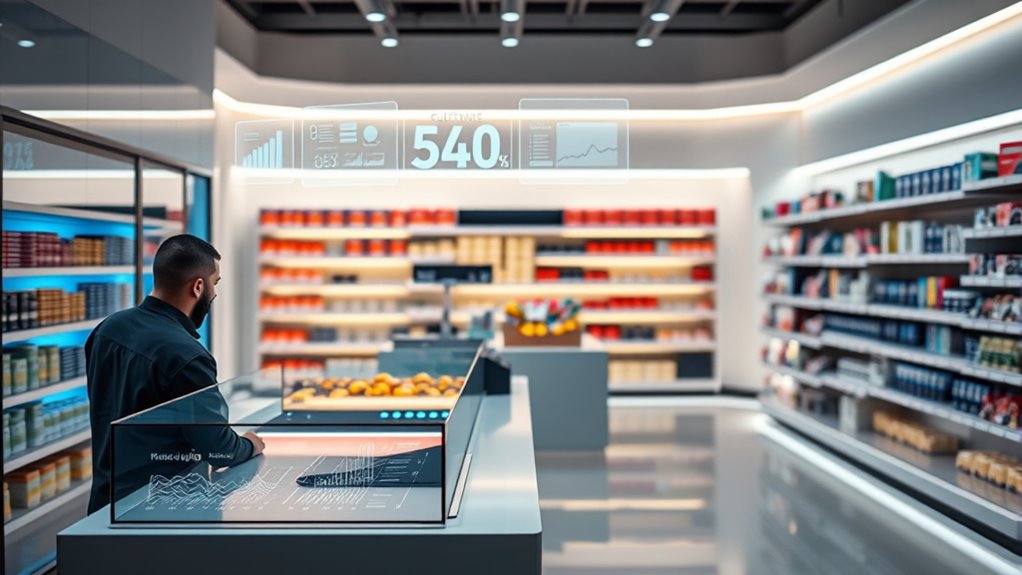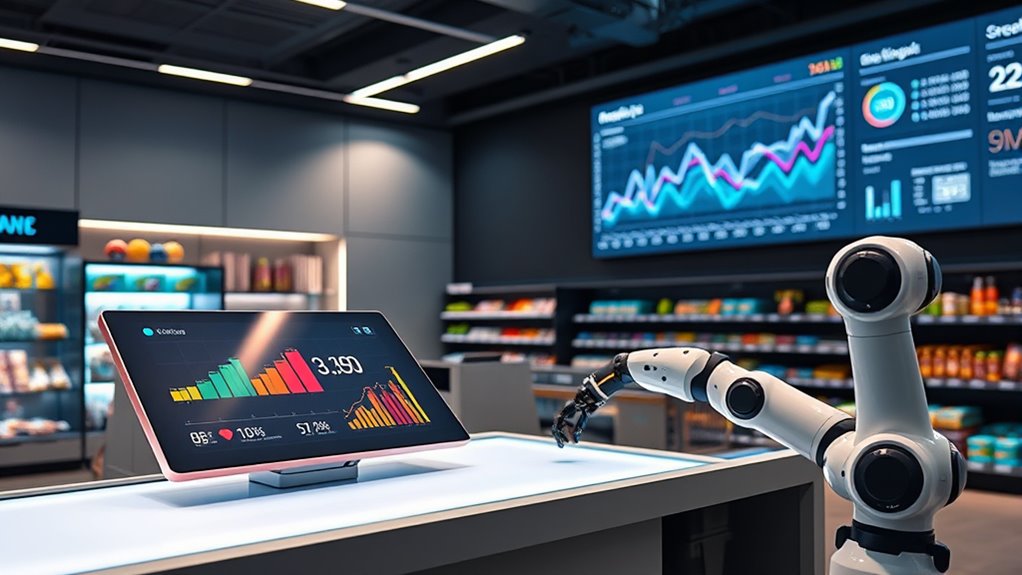AI is transforming retail profits by shifting emphasis from labor costs to data ownership. By harnessing proprietary data, you can personalize marketing, optimize inventory, and forecast demand more accurately, reducing waste and manual effort. This move offers a competitive edge as value moves from traditional labor margins to data-driven insights. If you want to understand how your business can leverage this shift, there’s more to explore below.
Key Takeaways
- AI reduces labor costs through automation in customer service, inventory management, and marketing.
- Proprietary data enables personalized marketing, dynamic pricing, and accurate demand forecasting, increasing revenue.
- Ownership and analysis of data provide granular insights, shifting profit reliance from labor margins to data-driven strategies.
- Data monetization becomes a core revenue driver, emphasizing the value of proprietary information over manual labor.
- Protecting data ensures consumer trust and regulatory compliance, supporting sustainable retail growth and competitive advantage.

Have you noticed how AI is transforming retail profits? In 2025, 77% of eCommerce professionals use AI daily, showing how deeply integrated this technology has become in operations. Retail leaders are confident about this shift, with 80% expecting AI-powered automation to be widespread by year’s end. Globally, 78% of organizations leverage AI in at least one business function, reflecting broad industry adoption. Meanwhile, around 500 to 600 million people worldwide engage with AI daily, influencing retail indirectly through consumer behavior and expectations.
AI is now essential in retail, with 77% of eCommerce pros using it daily and widespread industry adoption.
Despite its widespread use, only about 3% of AI users pay for premium services, highlighting current challenges in monetization. The real value isn’t just in automation but in shifting profit models from labor-intensive processes to data ownership. AI enables retailers to cut costs by automating customer service, inventory management, and marketing. This shift means profits increasingly depend on owning and exploiting proprietary data. Retailers who harness this data can deliver highly personalized marketing, dynamic pricing, and demand forecasting, creating new revenue streams.
Data ownership amplifies profitability because it provides granular insights into customer behavior, return causes, and inventory optimization. Retail executives now prioritize data analytics and AI to streamline decision-making and elevate customer experiences. For example, AI tools identify root causes of returns, reducing waste and manual labor. This progression from relying on labor margins to leveraging proprietary data is transforming the retail landscape, making data-driven profit centers more valuable than traditional labor-based margins. Additionally, data security ensures that sensitive information is protected, fostering consumer trust and compliance with regulations.
Applications like marketing automation, AI-powered chatbots, and dynamic pricing are already improving margins and efficiency. Nearly half of retailers use AI for marketing, and a third deploy chatbots to cut support costs. Forecasting and inventory planning driven by AI optimize stock levels and reduce waste. These improvements contribute to significant financial gains, which are reflected in the booming AI retail market—valued at USD 14.24 billion in 2025 and expected to reach over USD 96 billion by 2030. As AI becomes central to retail, owning and analyzing proprietary data emerges as a key competitive advantage, transforming how profits are generated and sustained in the digital age. The ability to monetize proprietary data effectively is increasingly seen as a core driver of retail success in the AI era.
Top picks for "shift retail profit"
Open Amazon search results for this keyword.
As an affiliate, we earn on qualifying purchases.
Frequently Asked Questions
How Do Small Retailers Benefit From Data Ownership Shifts?
You benefit from data ownership by gaining a strategic edge in your retail business. It lets you quickly adapt to customer preferences, personalize offerings, and respond swiftly to market changes. You also reduce reliance on vendors, improve data security, and build customer trust. Plus, owning your data opens doors for monetization and targeted marketing, boosting your profits. Overall, it enhances your agility, efficiency, and competitive advantage in a fast-changing retail landscape.
What Ethical Concerns Arise From Data-Driven Profit Models?
You might profit from data-driven models, but ethical concerns loom large. Privacy risks emerge when personal info is collected without clear consent, risking legal trouble and loss of trust. Bias in AI can lead to unfair treatment, alienating customers and inviting lawsuits. Lack of transparency fuels suspicion, and manipulative marketing exploits vulnerable populations. If you’re not careful, your profits could come at the expense of consumer rights, reputation, and long-term success.
How Can Workers Protect Their Data Rights in Retail?
To safeguard your data rights in retail, you should stay informed about laws like GDPR and CCPA, and understand your rights to access, correct, or delete your data. Always review your employer’s data policies, submit requests promptly, and use available channels to exercise your rights. Educate yourself on data security practices, and report any privacy concerns to ensure your personal information remains protected.
What Legal Regulations Govern Retail Data Ownership?
You must follow regulations like GDPR, CCPA, and state laws such as VCDPA and Maryland’s privacy laws. These rules require retailers to get explicit consent, disclose data practices, and respect customer rights to access, delete, or opt out. As a data owner, you’re responsible for setting access controls, ensuring data security, and regularly updating policies to stay compliant with evolving legal standards.
How Does Data Ownership Impact Consumer Privacy?
Think of data ownership as the key to a vault, shaping how much control you have over your personal info. When companies own your data, they can misuse it or mishandle it, risking your privacy. But if they respect clear ownership and transparency, you’re more likely to trust them. This balance influences your comfort sharing data and your confidence that your privacy is protected, ultimately affecting your loyalty and peace of mind.
Conclusion
As you walk through the bustling store of tomorrow, notice how the gleaming screens and clever algorithms now hold the true treasures. The old days of relying on workers’ hands fade into memory, replaced by the invisible weight of data. The future is a vast, shimmering vault where your choices fuel the unseen riches. It’s a quiet revolution, shifting power from labor to the silent, endless flow of data—your data—shaping what retail becomes.









